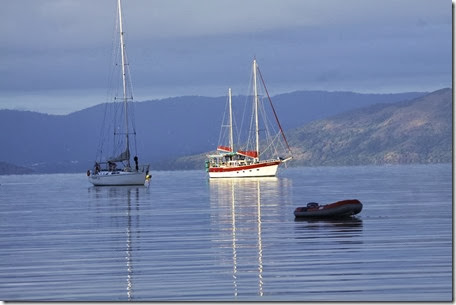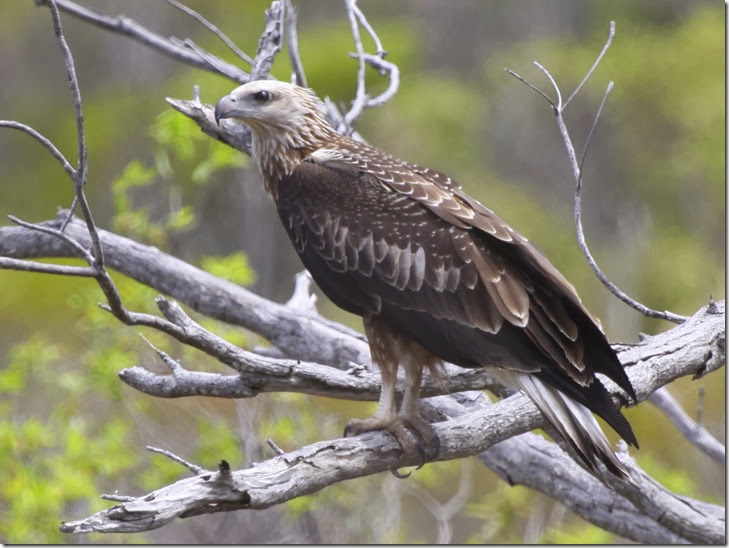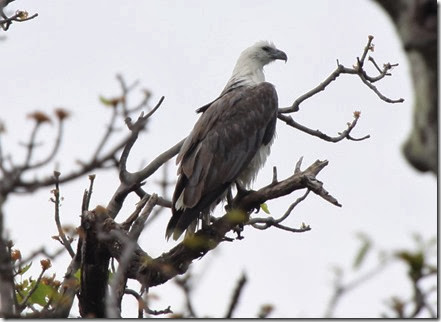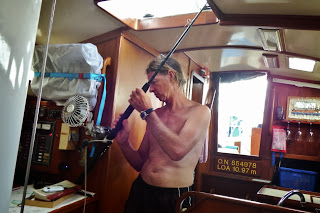An odd thing happened to me in Townsville, 2 days before we left. I had somehow picked up a tick while in town. It must have come off an overhanging branch from one of the trees along the road. It had attached itself to my head just above the hairline.
Ian managed to remove it and found that it hadn’t been there too long as it wasn’t bloated yet. That was lucky.
The morning we were leaving, bright and early, I woke with a very swollen face and a closed up eye. We decided I should go to the doctor before leaving, just to make sure I wasn’t going to die.
A couple of hours later, armed with Cortizone and antihistamines, we left for Magnetic Island. Half way there, the wind picked up for favourable southward sailing, so off we went, towards Gloucester Island instead.
All was good till that evening, when the wind changed direction and the weather turned nasty. We had bought more bananas, were we getting too complacent with them?
We quickly found an anchorage off Rita Island, which isn’t to be found in our anchorage bible. Ian is getting good at this. I think he should write a book on alternative anchorages
The next afternoon saw us anchored at a better known anchorage off Gloucester Island with a friendly name of Breakfast Bay.
We did a little fishing, as usual and before long, I caught an interesting looking fish with blue teeth. After putting him in a bucket of seawater to keep him alive, we looked him up in Grant’s Fish Guide to see if he was edible. Grant’s tells us that it was a Blue Tusk Fish – “ a well textured food fish with bright blue-green bones.” He was delicious!
The next day we went ashore to do some exploring. We found some sunscreen left on the beach which was handy, as the last one I found a few weeks ago had nearly run out.
There were quite a few Mistletoebirds on the island. I made some silly little noises that seem to attract birds. It worked and this female Mistletoebird came and had a curious look. The males have a bright crimson breast, similar to a Robin Redbreast.
A Young Sea Eagle lands nearby. He calls continuously to his parents for more food.
Our next island was Grassy Island. The unsettled weather continued and produced some heavy rain. We took advantage of it and washed our clothes, hair and anything else that looked a bit grubby.
We noticed a Sea Eagle sitting on a tree branch on the island, looking very wet and miserable. Later that day, after it cleared we went ashore and found that he had move to a sunnier spot to dry and rearrange his messed up feathers.
Next on the list was Hook Island, one of the larger islands of the Whitsunday group. We stayed at Nara Inlet, which provides protection from most weather directions. It is an outstandingly beautiful spot to anchor, somewhat reminiscent of the New Zealand fiords.


Large tides swirl around the foreshore boulders, creating natures sculptures.

Apparently, Nara Inlet is a breeding area for Hammerhead Sharks. I decided not to go snorkelling today and thought I might do some fishing instead. Ian said if I dropped a nail overboard, I might catch a Hammerhead.
From here, we went to Whitsunday Island where we snorkelled and saw squid.
At Shaw Island we found a freshwater stream which flowed down the hillside in a series of rock pools. Heaven is laying in one of these pools, looking through the overhanging palm fronds at the white fluffy clouds in an azure sky. Memories like these stay fresh forever.
Another stroke of luck at Shaw Island was that evening when we heard a thump in the cockpit. We went in search of the source of the thump and found a squid of edible size which had committed a kamikaze act. How convenient.
Next stop was Goldsmith Island. This was part of the Sir James Smith group of islands which all had wonderful names to do with forging and smithing, such as, Ingot Island, Solder Island, Farrier Island, Blacksmith, Silversmith and Lynne Island which threw a spanner in the works. Thinking Linne must be some smithing term that we hadn’t heard of before, Ian looked it up. Linne turns out to be the man that formulated the system of botanical classification using Latin names for genus and species. We’re not sure if he ever even came to Australia.

We found a really unusual tree which is Hoop Pine on the bottom and Golden Orchid at the top. I doubt that it has a name, either Latin or common.
By now our fresh food supplies had almost run out, so our next destination was Mackay.
On our return bus trip from shopping, we met a woman who had sailed around Australia with her husband on a 21 foot yacht. It took them 6 years. They were living on that boat in the marina, so Ian and I went for a walk later that evening to have a look at it.
It was tiny and had been built in 1893. This was a reality check for me, who had been secretly thinking lately that maybe we should have a bigger boat with a watermaker and a hot shower on board. The truth is, Winkali (36 foot, built 1990) is palatial in comparison.
I’ve had a couple of computer problems lately which is why I haven’t blogged lately. I managed to Google up the problem just before we left Mackay and I’m back in business.
Right now we’re at Curlew Island which is just south of the Whitsundays.

Although we have sailed through countless schools of fish, they are impervious to our fishing lure and the closest we come to catching one, is on our camera.
The above photo is a collage of 7 photos I took going through these schools. I'd like to get all this in one photo but I don't think it will ever happen.





.jpg)

.jpg)









.jpg)









.jpg)
.jpg)
.jpg)
.jpg)
.jpg)
.jpg)
.jpg)